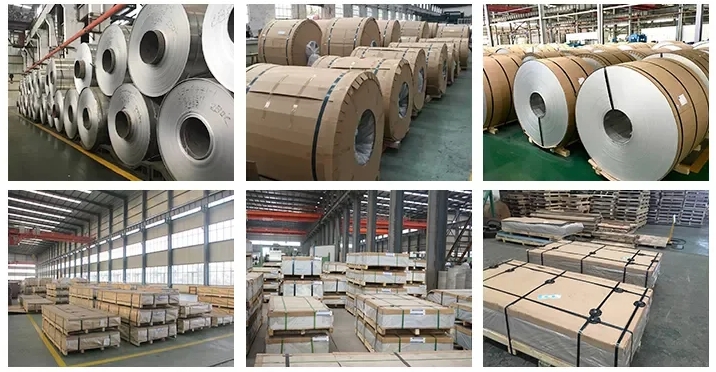| 1050 | 1060 | 1100 | 3003 |
| 3004 | 3105 | 5052 | 5005 |
| 5083 | 6061 | 6063 | 7075 |
| etc |
What is Aluminum Coil?
Aluminum coil is a rolled product made from aluminum alloy. It is usually in the form of a long, thin sheet that is coiled for ease of transportation and storage.
Manufacturing: Aluminum coil is produced by rolling aluminum ingots or billets through a series of rollers to achieve the desired thickness and width.
Properties: It offers lightweight, good conductivity, and excellent corrosion resistance. Aluminum coil can be anodized or coated to enhance its appearance and corrosion resistance.
Applications: It finds wide use in various industries such as construction (roofing, siding), automotive (auto bodies), packaging (cans, foil), and electronics (heat sinks).
Processing: Aluminum coil can be further processed into different products by cutting, forming, bending, or welding, depending on the specific application.
Advantages: The benefits include its lightweight, which reduces the overall weight of structures or products, and its corrosion resistance, which increases durability.
If you have any particular questions about aluminum coil or its applications, feel free to ask. I'm here to help!
Specification of Aluminum Coil:
| Grade | 1050,1060,1100,3003,3004,3105,5052,5005,5083,6061,6063,7075,etc |
| Standard | ASTM SAE EN JISISO GB |
| Size | According to the customer's requests |
| Thickness | 0.1mm-10.0mm |
| Width | 100mm-2500mm |
| Certifications | ISO 9001,SGS,BV |
Alloy and Temper
| Alloy | Temper |
| 1000 Series: 1050,1051A, 1060, 1100 | O, F, H12, H14, H16, H18, H22, H24, H26, H28 |
| 3000 Series: 3003, 3004, 3005, 3105 | |
| 5000 Series: 5005, 5052, 5754, 5083 | O, F, H22, H24, H26, H28, H32, H34, H36, H38 |
Varieties:
Aluminum sheets come in various alloys and finishes to suit specific needs. The alloy numbers indicate the mixture of aluminum with other elements, which can significantly affect its strength, ductility, and other properties. Common series include:
1xxx Series: Primarily pure aluminum, highly conductive and corrosion-resistant, but with lower strength. Suitable for electrical applications and chemical equipment.
3xxx Series: Alloyed with manganese, offering more strength than pure aluminum without sacrificing corrosion resistance. Common in cooking utensils and in the automotive industry.
5xxx Series: Alloyed with magnesium, providing a good balance of strength, corrosion resistance, and weldability. Often used in marine and transportation applications.
6xxx Series: Alloyed with magnesium and silicon, making them heat-treatable. They are versatile with a good balance of strength, corrosion resistance, and formability. Used in structural applications and in the automotive industry.
Finishes can range from mill finish (as it comes from the mill, without any surface treatment), painted, anodized (to increase corrosion resistance and allow dyeing), or coated in various ways to enhance durability or appearance.
Our Factory:


Applications of Aluminum Coil:
Aluminum coil, thanks to its lightweight, high conductivity, corrosion resistance, and excellent workability, finds applications in a wide range of industries and products. Here are some key applications:
1. Construction and Building
Roofing and Siding: Aluminum coil is widely used in the construction industry for roofing, siding, and cladding systems due to its durability and resistance to weather conditions.
Windows and Doors: Its strength and lightweight make it an ideal material for frames and panels.
Insulation: Aluminum foil, made from aluminum coil, is used in building insulation materials to reflect heat and improve energy efficiency.
2. Automotive and Transportation
Body Panels and Frames: The automotive industry uses aluminum coil for body panels, frames, and structural components to reduce vehicle weight and improve fuel efficiency.
Heat Exchangers: Its excellent thermal conductivity makes it suitable for radiators, air conditioners, and heat exchangers in vehicles.
Trim and Decorative Components: Aluminum is used for trim pieces and decorative elements due to its ability to be easily anodized for color and enhanced corrosion resistance.
3. Electrical and Electronics
Conductors: Aluminum coil is used to produce wires and cables for electrical transmission and distribution due to its good conductivity and lower cost compared to copper.
Heat Sinks: Its thermal conductivity makes it suitable for heat sinks in electronics and electrical devices to dissipate heat efficiently.
4. Packaging
Food and Beverage Containers: Aluminum coil is used to manufacture cans, foil wraps, and other containers due to its barrier properties, protecting contents from moisture, light, and contaminants.
Pharmaceutical Packaging: It's used in blister packs for tablets and capsules for its protective qualities.
5. Consumer Goods
Appliances: Refrigerators, air conditioners, and cookware often use aluminum coil for components because of its corrosion resistance and heat transfer properties.
Furniture: Lightweight and durable, aluminum coil is also used in furniture design, particularly for outdoor furniture.
6. Aerospace
Structural Components: The aerospace industry utilizes aluminum coil for airframes and components because of its strength-to-weight ratio and corrosion resistance, essential for high-performance and longevity.
7. Marine
Hulls and Structures: Boats and ships often use aluminum for hulls, superstructures, and other components because it doesn't rust in saltwater environments.
8. Energy
Solar Panels: Frames for solar panels and reflective layers in solar thermal collectors are made from aluminum coil, leveraging its reflectivity and durability.

We don't use cookies to personalize content and analyze our traffic. We only contact you through the form and email. Privacy Policy